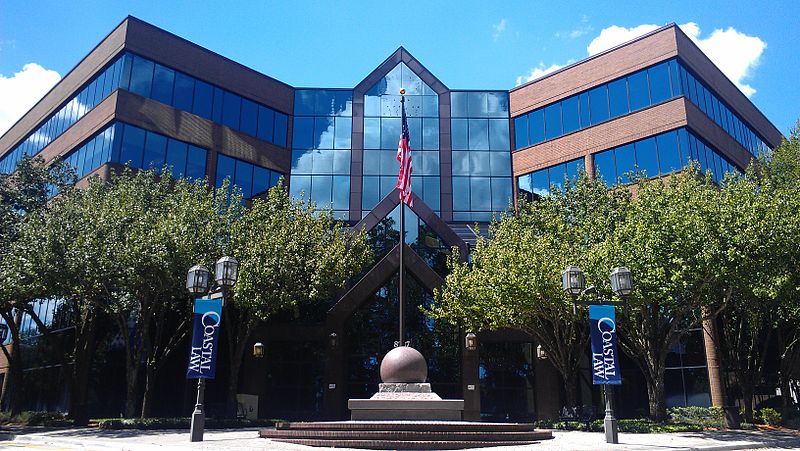After being denied Title IV funds, Florida Coastal sues Education Department

The Florida Coastal School of Law. Photo from Wikimedia Commons.
Florida Coastal School of Law, which lost its federal financial aid in April, and by June had an approved teach-out plan with the ABA, sued the U.S. Department of Education on Tuesday, alleging the agency acted arbitrarily and capriciously, without due process, when it terminated the for-profit school’s participation in the loan program.
The law school, which is the last of three for-profit schools still in business owned by InfiLaw, an entity of the private equity firm Sterling Capital Partners, filed the action in the U.S. District Court for the Middle District of Florida. The law school also filed a July 20 emergency motion for a temporary restraining order, asking that court vacate the Department of Ed’s April 2021 decision to end Florida Coastal’s participation in federal financial aid programs.
A Florida Coastal spokesperson told the ABA Journal in an email that at this time the school is bound by its teach-out plan, which states that current students will finish courses at other ABA-approved law schools. In June, Peter Goplerud, Florida Coastal’s president and dean, told the ABA Journal classes would end after the summer term.
The department in May denied Florida Coastal’s reinstatement application, and in a press release stated that the law school failed to meet standards for financial responsibility, fiduciary conduct and participation. The writing also stated that a private equity firm with 98.6% ownership in the school had relinquished its ownership.
“Florida Coastal School of Law operated recklessly and irresponsibly, putting its students at financial risk rather than providing the opportunities they were seeking,” Richard Cordray, chief of the department’s office of Federal Student Aid, said in a news release.
In the 61-page complaint, Florida Coastal states that its graduates have “outperformed their counterparts at peer schools” on the Florida bar exam, and 90.5% of the school’s May 2020 graduating class had full-time employment. According to ABA data, the law school’s first-time pass rate for the class of 2020 was 59.32%, and its two-year pass rate, based on 2018 graduates, was 77.36%. Out of a total of 64 graduates in 2020, approximately 58% percent had full-time, long-term jobs that require bar passage, the data states.
Florida Coastal had been pursuing nonprofit status, and Campbellsville University, a Kentucky private school associated with the Baptist Church, was interested in acquiring it, according to the lawsuit. The ABA in December 2019 rejected Florida Coastal’s substantive change application to convert to a nonprofit law school.
Also, the lawsuit takes issue with the Department of Education requiring that Sterling Capital sign a financial aide program participation agreement. Sterling was contractually barred from signing such an agreement, but volunteered a $1 million letter of credit to remove the signature requirement, according to the action.
The lawsuit claims that Sterling Capital was a dissolved fund, and its only asset was ownership in the law school.
Additionally, “the school’s owner” posted a $5.6 million letter of credit, because the Department of Education represented that would allow the school to remain eligible for financial aid, according to the complaint. It does not name the owner; a Florida Coastal news release states that the $5.6 million was generated from the personal funds of the school’s “various stakeholders.”
It’s clear the department’s goal was not to secure additional financial security for the school, according to the complaint.
“Instead, it sought to close a viable school and upend the lives [of] FCSL’s students and faculty and reduce the value of the hard-earned degrees held by thousands of FCSL graduates,” the complaint states.
At one point, InfiLaw owned three for-profit law schools. The Arizona Summit School of Law entered into a teach-out plan in 2018, and the Charlotte School of Law shut down in 2017. Florida Coastal is the only InfiLaw campus that has not been placed on probation by the ABA, but it has had various public notices of non-compliance, later resolved.
The three schools filed separate due process actions against the ABA in May 2018, regarding accreditation, and the claims settled in 2019.



